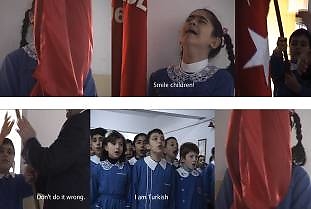The works in the exhibition reflect upon various types of sound, song and music, ranging from background music, to a national anthem, the Islamic call for prayer and experimental concert music. Participating artists use a range of artistic strategies to examine the arrangements and processes implicit in the production, reception or consumption of this music, and they make an inextricable link to the highly debated issue of cultural and social identity. All the works of art in this exhibition in some way or another deal with music in the public realm such as the graveyard, church, school and art institution.
Emily Bates (UK/Amsterdam) presents the first part of her ongoing project, The Nurturing Island, a series of black and white bariet prints with an audio track. The work is based on research into a tropical island in the south of Japan that utilizes a system of nurturing its community through the employment of announcements at set times throughout the day, acting as reminders and signifiers. Each village has selected specific tunes and schedules, which vary with the season. The Nurturing Island project investigates this system and its relation to the physical context of the island and its community.
Justin Bennett (UK/The Hague) presents a newly commissioned audio installation based on radio archive footage from the Holland Festival in Amsterdam in 1969. During the performance of Karl-Heinz Stockhausen’s work, Stimmung, some audience members disrupted the performance, first by participating ‘musically’, then by applauding before the piece ended. After the third disruption, a heated debate about audience participation took place amongst the organizers and different groups of the audience.
Luke Fowler (Glasgow) shows Pilgrimage from Scattered Points, a subjective documentary film about the composer Cornelius Cardew (1936-81), one the leading champions of contemporary music in Great Britain. Cardew worked as an assistant to Karlheinz Stockhausen, was a member of the group AMM and founded the Scratch Orchestra. Cardew arranged numerous happening-like concerts with amateur musicians in surprising locations. Later, however, he denounced art music and concentrated on composing working-class songs and was closely involved in other forms of political activism. Fowler's film explores not only an engaging subject, but works as an audiovisual collage that is full of originality and surprise.
Haroon Mirza (Sheffield/London) shows an installation consisting of two elements: Birds of Pray, a sculpturally based audio environment and Adhãn, a video projection. Like the Sirens’ song from Greek mythology, Adhãn, is based on a calling-out, the Islamic calling to prayer, introducing complex ideas of the relationship of religion to death. While religions offer the possibility of transcendence, the negative ideas of religion espoused by humanism and atheism see its ostensible existence as an emotional crutch, to help individuals cope with uncertainty over things that they cannot control. Alternatively argued, religion stands as power mechanism, an authoritarian force
Vladimir Nikolic (Belgrade) presents the video Death Anniversary, the result of a trip by the artist to Montenegro. Here he looks for a singer willing to a sing a ‘dirge’ (mourning song) to Marcel Duchamp at the famous concept artist’s grave in Rouen (France). One singer, whose singing reflects the artist’s conception of Duchamp most accurately, travels with him to France. The dirge that she sings at the grave was written in co-operation with the artist. Based on a local artistic tradition in danger of dying out, Nikolić’s video takes an ironical view of the self-perception of modern art, that once proclaimed its independence of history and tradition. Now it has become part of this tradition itself.
Rory Pilgrim (UK/Amsterdam) presents Love in Uganda, a performance and installation around a piece of music he has written in response to the anti-Homosexuality bill trying to be passed in Uganda. The bill implements a historical law made by the British when Uganda was a colony. Pilgrim asks the Anglican Christ Church, and the English United Reformed Church in Amsterdam if his piece of music could be performed within the space of the church. At SMART Project Space Pilgrim presents an installation including the music sheets, the announcements to the performance, and a sheet of paper with telephone numbers of persons who have particular significance to the bill – such as the mobile number of the Ugandan minister who is behind this. The phone numbers allude to the use of voice and speech, and a contrast of what is said collectively through music instead of what is said by the individual.
Support Structure is a project by Celine Condorelli and Gavin Wade that aims to create an architectural interface between people and places. ‘music for museums’ turns the museum from a place of consumption to a place of production, and is a soundtrack for museums produced using the history of the muzak corporation. Background music was developed for a specific range of functional areas within gallery and museum spaces. The piece questions contemporary exhibition environments’ default position of ‘neutrality’, and reconsiders them as places of production; it addresses the existing cultural and commercial typologies of the museum to stimulate critical engagement with ‘functional music’. The commercially available CD features the Beijing artists: 718, Yan Jun and Zafka as well UK-based Isambard Khroustaliov and ISAN and was released on Kwanyin records.
SMART Project Space is currently negotiating with several local supermarkets to play Support Structure’s previous project music for shopping malls.
Katarina Zdjelar (Belgrade/Rotterdam) shows the video piece Don’t Do It Wrong which investigates how social rituals build and promote a sense of belonging. Filmed in a primary school in Istanbul, the work traces a daily ritual in which the director and staff of the school choreograph the morning school flag raising. This ritual occurs every day in all Turkish primary schools and in the army since the 1920s. This work investigates how the process of bonding and binding to a collective body occurs. It focuses on the way that power is imposed and exercised, rendering the institutional mechanism of implementing a sense of national cohesion visible.
Opening
Saturday 15 May, 21.00 hrs
